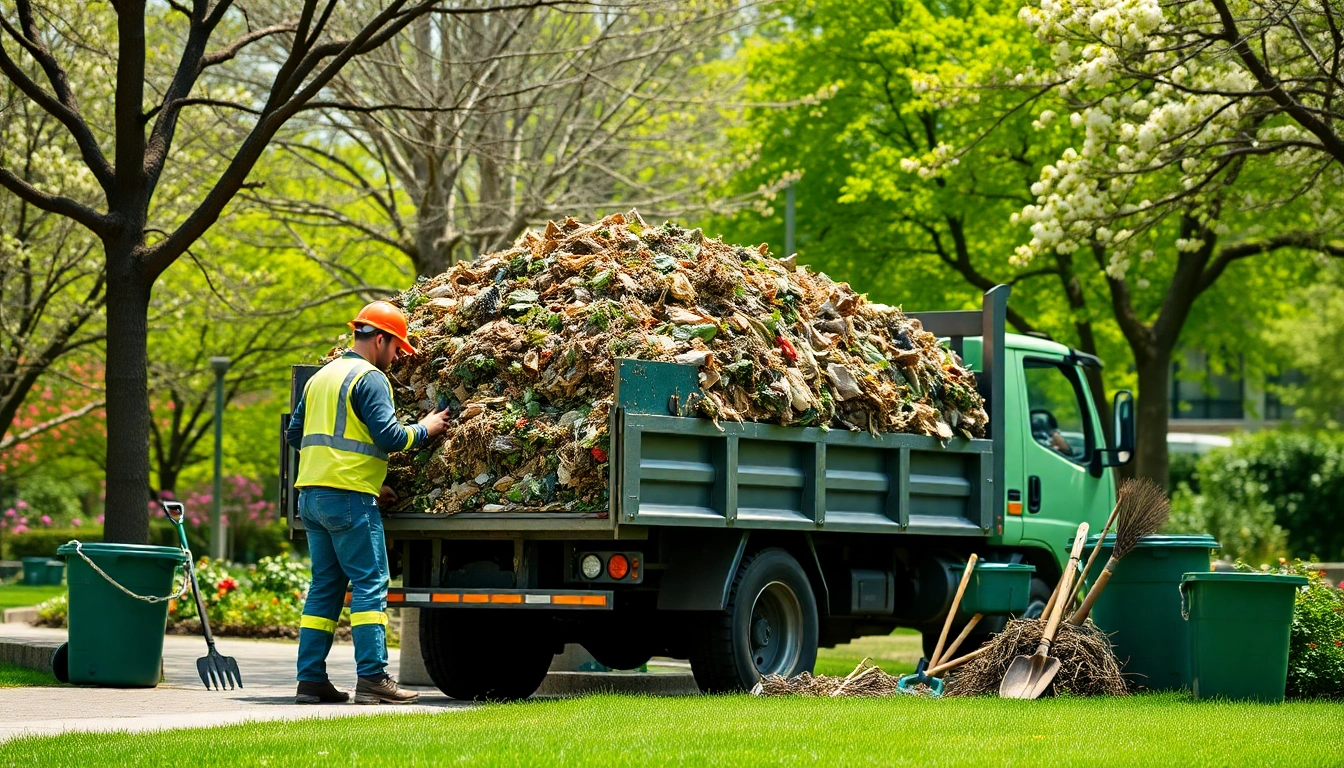Enhancing Your Garden Waste Collection Service for a Cleaner Environment
Understanding the Importance of Garden Waste Collection Service
Managing garden waste is a vital aspect of maintaining a clean and healthy environment. With urban gardening becoming popular, the volume of organic waste produced annually is on the rise. The inconsistency in handling this waste can lead to various environmental issues including pollution and unhealthy living conditions. A reliable Garden Waste Collection Service serves not just residential spaces, but contributes to community well-being by implementing efficient waste management practices.
What is Garden Waste Collection Service?
Garden waste collection service refers to the systematic collection and disposal of organic waste derived from residential gardens. This includes any plant material such as grass clippings, branches, leaves, and other garden refuse. While homeowners can personally manage their garden waste through composting or burning, professional services ensure the waste is treated sustainably and effectively, reducing its environmental footprint. These services often provide bins, scheduled pickups, and specialized equipment to handle various types of green waste.
The Environmental Impact of Effective Waste Collection
Effective garden waste management not only keeps green spaces tidy but also plays a significant role in the ecosystem. When garden waste is collected and processed responsibly, it can be turned into compost and mulch, enriching the soil and promoting plant growth. By diverting waste from landfills, effective collection services significantly reduce greenhouse gas emissions caused by organic matter decomposing in anaerobic conditions. Furthermore, they contribute to a circular economy, where waste is repurposed, reducing the demand for synthetic products.
Common Types of Garden Waste Handled
Garden waste encompasses various types of organic materials. Commonly collected items include:
- Grass clippings
- Leaves
- Small branches and twigs
- Weeds
- Plant trimmings
- Houseplants or garden pots
Sorting these items ensures effective recycling, as different types of waste may require different disposal methods.
Key Benefits of Using a Professional Garden Waste Collection Service
Time and Cost Efficiency for Homeowners
For busy homeowners, managing garden waste can be a time-consuming and labor-intensive task. A professional garden waste collection service allows homeowners to focus on enjoying their gardens rather than worrying about waste management. Such services bring their expertise and resources, ultimately saving time and reducing the physical effort involved. Additionally, many services offer competitive pricing schemes, ensuring that homeowners can manage their waste without incurring significant costs. Investing in a professional collection service can yield benefits in terms of time and money.
Improved Waste Management and Recycling Rates
Professional garden waste collection services have the systems in place to efficiently collect, sort, and recycle organic waste. They consistently achieve higher recycling rates compared to individual efforts. This efficiency is largely due to advanced separation techniques and knowledge of local recycling guidelines, minimizing the risk of contamination that can occur when homeowners mix garden waste with other types of rubbish. Ultimately, these services contribute to a healthier environment by ensuring a greater percentage of organic waste is repurposed rather than disposed of in landfills.
Enhancing Community Aesthetics and Sustainability
Maintaining clean and attractive neighborhoods increases property values and enhances community pride. A comprehensive garden waste collection service promotes sustainability by encouraging residents to engage in environmentally friendly practices. When communities adopt consistent waste collection services, the overall aesthetic improves, reducing the proliferation of pests and diseases associated with unmanaged waste. By fostering a culture of sustainability, these services empower communities to take responsibility for their environment.
Best Practices for Effective Garden Waste Collection
Proper Segregation of Garden Waste
Segregation is the cornerstone of effective waste management. For a garden waste collection service to function optimally, it’s crucial that different types of waste are separated prior to collection. Homeowners should be educated on which materials are acceptable and encouraged to use designated bins. By ensuring that only garden refuse is placed in collection bins, the service can operate more efficiently and minimize contamination risks that could lower recycling rates.
Scheduled Pickup and Maintenance Strategies
A well-organized schedule for waste collection ensures that residents know precisely when to expect service, reducing confusion and enhancing satisfaction with the service. Regular maintenance of collection equipment (like bins and trucks) is also crucial to prevent service disruptions. Implementing a feedback loop where residents can voice any concerns permits continuous improvements in scheduling and maintenance, shaping a service that effectively responds to community needs.
Utilizing Eco-friendly Equipment and Techniques
To truly embrace sustainability, garden waste collection services should utilize eco-friendly equipment, including hybrid or electric vehicles that reduce carbon emissions and noise pollution during pickups. Additionally, employing techniques that minimize damage to the environment while collecting waste can significantly enhance the service’s overall impact. Investment in green technologies can serve to bolster market competitiveness while reinforcing commitment to sustainability.
Common Challenges in Garden Waste Collection Service
Dealing with Contamination in Collection Bins
One of the most common challenges faced by garden waste collection services is contamination. Often, residents may inadvertently mix non-organic materials such as plastics or metals into their garden waste bins, leading to increased processing costs and reduced recycling rates. Education campaigns can help raise awareness and provide clear guidelines about what can and cannot be placed in collection bins. Regular checks and enforcement of guidelines may also assist in reducing contamination problems.
Seasonal Demand Fluctuations and Resource Management
Garden waste production is highly seasonal, with peaks during spring and fall when gardening activities are at their height. Effective waste collection services must be adept at managing resource allocations, staffing, and fleet availability to cope with these fluctuations. Implementing flexible staffing strategies and optimizing routes can help balance the demands of the service effectively. Additionally, data analytics can provide insights into seasonal trends, allowing for better resource planning.
Adapting to Local Regulations and Guidelines
Garden waste collection services operate within the framework of local laws and regulations concerning waste management. Staying compliant with these ever-evolving laws can be challenging. Establishing robust relationships with local regulatory bodies ensures that collection services receive timely updates on any changes to guidelines. Active participation in workshops and forums also aids companies in addressing compliance proactively, thus maintaining service effectiveness and credibility.
Measuring Success in Garden Waste Collection Service
Key Performance Indicators (KPIs) for Waste Collection
To assess the effectiveness of a garden waste collection service, it is vital to establish and monitor Key Performance Indicators (KPIs). Metrics such as customer satisfaction rates, recycling percentages, the volume of waste collected, and contamination rates can provide valuable insights into the service’s performance. Regular monitoring allows for ongoing improvements and fosters the ability to set realistic targets for future success.
Gathering Customer Feedback for Service Improvement
Customer feedback serves as an invaluable resource for understanding the needs and expectations of residents utilizing garden waste collection services. Regular surveys and feedback forms, along with analyzing complaints and praise, provide actionable insights for service enhancement. Engaging with customers ensures that the service evolves to meet their expectations while fostering strong community relationships built on trust and transparency.
Innovative Technologies for Monitoring Collection Efficiency
Innovation plays a crucial role in enhancing the efficiency of waste collection services. The integration of technology such as GPS tracking, route optimization software, and mobile applications can significantly streamline operations. These tools enable real-time monitoring of collection efficiency, ensuring that services are completed promptly and addressing any issues as they arise. Embracing smart technology not only enhances service quality but also positions the operation as a leader in sustainable waste management.









Post Comment